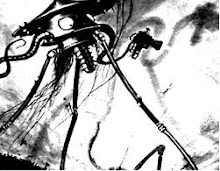Time Magazine writes today that Radiohead's new album is going to be self-released. That's nothing new, but here's what makes it interesting:
In Rainbows will be released as a digital download available only via the band's web site, Radiohead.com. There's no label or distribution partner to cut into the band's profits — but then there may not be any profits. Drop In Rainbows' 15 songs into the on-line checkout basket and a question mark pops up where the price would normally be. Click it, and the prompt "It's Up To You" appears. Click again and it refreshes with the words "It's Really Up To You" — and really, it is. It's the first major album whose price is determined by what individual consumers want to pay for it. And it's perfectly acceptable to pay nothing at all.
Simply awesome. I'd be interested in seeing the data collected, as well as the average/median price paid for the digital download. This has the potential to dispel any myths about file-sharing and bittorrent, especially if it turns out that many people will pay a reasonable price for an artist's music if the buyer knows that his/her money will be going directly to the artist, not a record label.
And this quote from singer Thom Yorke sums up nicely what I think of record labels these days:
I like the people at our record company, but the time is at hand when you have to ask why anyone needs one. And, yes, it probably would give us some perverse pleasure to say 'Fuck you' to this decaying business model.
A decaying business model it is. Record labels are parasites on the hard work of (usually) talented performers. With the rise of digital music, mp3 players, the internet, and a continued decline in the sale of physical copies of music (i.e. CDs), there really doesn't seem to be a purpose for record labels anymore. Artists can now do almost everything that a record label would traditionally handle -- production can be done cheaply with a home computer and the right software; distribution, as well as advertising, can be handled through the artist's website or a social-networking website. Add to that the fact that digital files of music are a much more popular method of collecting music than the purchase of physical copies of music, and the expenses of distribution are a lot lower than they have been in the past.
In a related note, I want to point out that
Polyvinyl Records is doing something interesting with digital downloads. If you buy the vinyl LP, Polyvinyl will give you a code to download a digital version of the record from their website. A very cool idea, and one that I am particularly taken with, since I am an avid vinyl enthusiast, but I'd also like to make a digital archive of my records. This just makes that process a little easier!
The end of the
Time article raises another interesting point:
Meanwhile, as record sales decline, the concert business is booming. In July, Prince gave away his album Planet Earth for free in the U.K. through the downmarket Mail on Sunday newspaper. At first he was ridiculed. Then he announced 21 consecutive London concert dates — and sold out every one of them.
This is nothing new either, since artists have always made more money on tour than through the sale of records. Just read Steve Albini's "
The Problem with Music," which lays out in stark terms just how fucked the average major label act really is.
Once artists set up their own distribution networks through the internet, outside of the music business, there will really be no reason left for record labels to exist anymore. Except for the fact that these labels still hold copyright over most of their catalogs, their demise is almost certain if Radiohead's experiment works.







